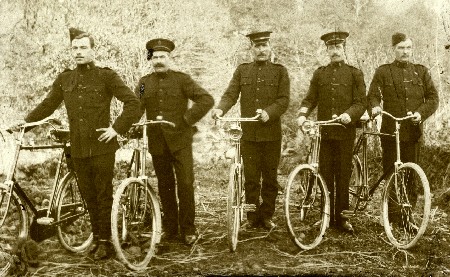|
<< Back to the main Local History page
Our turbulent history turns up many conundrums, and I have to admit that I fall into the category of those who are not entirely comfortable with the glorification of Irishmen who wore the uniform of the Crown at a time when this country was being oppressed. However, your recent publication of photographs of Lucan men in the Kings’ uniform did set me thinking about those men, in particular those who were not of Anglo-Irish stock, who chose to serve the Crown. This led me to uncover some records of an event in 1921 that serves to illustrate the paradoxical nature of our convoluted history, and certainly, my own perspective on the matter.

A typical RIC bicycle patrol in the early 1900s – Image Courtesy of Waterford County Museum
On Wednesday 30th March 1921 an ambush occurred at a location variously described by the Irish Independent of the following days as, at Ballyfermott (sic) near Lucan, Red Cow, Naas Road or simply Lucan. Wherever this event actually occurred, the RIC Sergeant and Head Constable who were returning on cycle patrol to Lucan Barracks and that died as a result of the attack by Republican forces, were not only Lucan residents, but Irishmen. They were not the feared and despised mercenaries of the RIC temporary reserve force known as the Black and Tans, nor were they part of the other equally feared and despised Auxiliary Division force. These men were Irish, born and bred, the Sergeant who had previously served in Chapelizod coming from Cahirciveen, and the Head-Constable who had previously served in Belfast, where an Orange mob seriously injured him, having his parents living in Roscommon. Further archive digging on my part revealed that the 1911 census showed that the Head Constable in Lucan Barracks and the Sergeant in Chapelizod of that period, were not only Irish men, but Irish speakers also.
Now it could be said that these men, who wore the uniform of a force that upheld the oppressive status quo, were therefore enemies of Irish freedom and that may be true, but why would real Irish men chose to do so? The answer could be shockingly straightforward. The ordinary people of Ireland were hopelessly poor, and the opportunity to have a stable job and income gave a man a decent chance of supporting his wife and family and hopefully provide a better future for his children. No reasonable person could fail to see that the chance of a reasonably secure future in uniform, even that of an oppressive state, might take precedence over a life based on principle but with a very unsure future. Sergeant Hallissy and Head-Constable Mulrooney of Lucan barracks were Irishmen, as much so as the men whose principles and desperation caused them to fight the RIC and ultimately kill them. Sergeant Hallissy and Head-Constable Mulrooney were also as brave as the men who fought them, and as much victims of the circumstances that caused our little island so much pain.
Is mise le meas,
Dónal Murray
www.donalmurray.co
|

